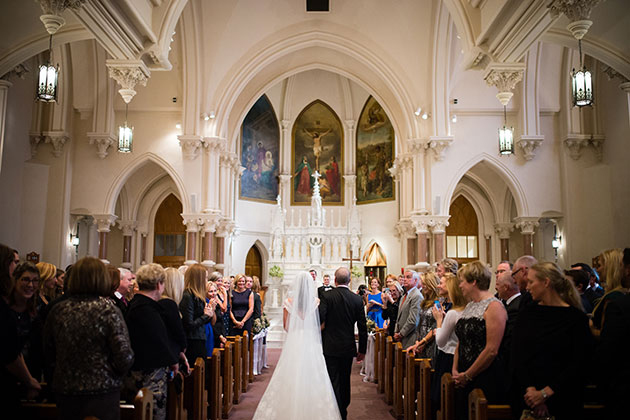
Photo: Grace Winter of Asya Photography
Catholic weddings are full of time-honored traditions, but they’re more than just a few Bible verses and a priest officiating. There are certain elements that you’ll see at every Catholic wedding you attend, so we’ve turned to our experts to break down what those key components are. Now, you’ll know exactly what to expect when you sit down in that pew.
The Church
To have a truly Catholic wedding, you’ll need to be in a Catholic church. That’s right, you can’t have an “official” Catholic ceremony anywhere else. You can, of course, submit a request to your bishop to see if you can have your ceremony outdoors or somewhere else (like a hotel ballroom), but exceptions are few and far between.
Mass
If both the bride and groom are Catholic, chances are the ceremony will take place during a Nuptial Mass. It isn’t required, but many couples choose to do so and include sacraments like the taking of communion in their ceremony. A Catholic Mass includes a gospel, homily, consecration, and communion, with the selections of readings and psalms determining how long the Mass will be. If the couple has a ceremony that isn’t a Nuptial Mass, it will include the basics (vows and the exchange of rings) without other sacraments.
Psalms
These songs, recorded in the Book of Psalms, are sung by a cantor and the congregation. Responsorial psalms are the congregation’s reaction to the word of God, with the cantor singing the verses and the congregation singing the responses (essentially the chorus).
See More: The Jewish Wedding Ceremony Traditions You Need to Know
Rite of Marriage
These are the vows! Wording may vary from church to church, but they tend to follow a similar pattern: “I (your name) take you (his/her name) to be my (husband/wife). I promise to be true to you in good times and in bad, in sickness and in health. I will love you and honor you all the days of my life.”
Holy Communion
Also called the Eucharist, if you are having a Nuptial Mass, communion will take place after the vows are exchanged. You may want to discuss with your priest during the rehearsal which members of your families and wedding party will be taking communion. Talk to your priest about whether your non-Catholic guests should remain in their seats, or if they should line up along with other guests and simply refrain from taking communion when they reach the altar.
